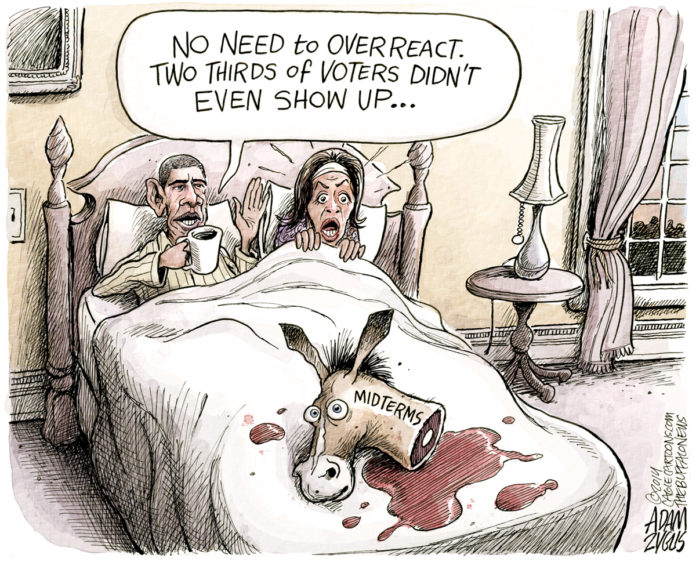BY RALPH NADER
 Did the Republicans win these mid-term elections? Or did the Democrats lose?
Did the Republicans win these mid-term elections? Or did the Democrats lose?
The numbers show that in contested Senate races, where the Republicans picked up seven seats and will probably gain two more to take control of the Senate, voters did not support those Democrats who were the most wishy-washy.
In their campaigns, the defeated Democratic senators ran away from President Obama and often bragged about opposing his policies. But where did these senators run to? Certainly not to popular policies that appeal to Americans where they live, work and raise their children.
Getting Sen. Mark Pryor to support a minimum wage increase took many months. By the time he saw the popularity of a statewide citizen-driven initiative on the ballot and switched, he appeared more as an opportunist than a leader.
Shortly after, his Republican successor, Congressman Tom Cotton switched as well. All four initiatives to raise the minimum wage won in conservative “red states.”
Many defeated senators tried to localize the election by dumping on Obama and the national Democratic Party. They avoided siding with the people on matters such as strong law and order for corporate crimes against consumers, patients, workers, community and environmental health. They avoided talking about revising both the failed war on drugs and the failed war on terror that have resulted in more drugs in our country and created more anti-American groups around the world.
Washington Post columnist, the ever perceptive Steven Pearlstein, wrote just before the election that the “Democratic candidates find themselves caught in a vicious cycle in which their refusal to embrace and defend their party’s brand is discouraging the faithful and turning away the undecided, threatening their election prospects still further.”
Turning out young and minority voters requires candidates to articulate progressive visions of an America that will provide opportunities for improving the livelihoods for millions of lower-income, low-paid, underemployed or employed laborers. Low turnouts of these eligible voters this past Election Day ensured Democratic Party losses [nationwide turnout only reached 33%].
People have to believe that their vote means something. Viewing the billions of dollars of repetitive, negative, insipid political television ads created by both party’s political/corporate consultants doesn’t motivate voters to show up at the polls.
Unfortunately, unlikely voters are the majority, outnumbering by about six to four those who voted this year.
The Mark Pryor senatorial campaign in Arkansas provides a teaching moment regarding political cowardliness. He had everything going for him – plenty of money and a father who was a popular former Senator and was visible in his campaign. Bill Clinton even came back to his native Arkansas six times and traveled to many communities in the state to lavish praise on Sen. Pryor.
Yet on Election Day, Pryor lost big. Why? Because he did not speak truth to power; he couldn’t stand on his record in the Senate because he didn’t have one.
As Chairman of the Senate Consumer Protection, Product Safety and Insurance Subcommittee for some time, he was asleep at the switch; he did not return calls from civic leaders to strengthen his network and did not have high profile public hearings on the myriad of corporate abuses involving cheating, stealing and injuring consumers.
President Obama, by not barnstorming the country, reinforced the stereotype that he is a liability to his party. Obama could have united the nation behind a minimum wage raise [a restoration of purchasing power] for 30 million workers who today make less than workers made in 1968, adjusted for inflation.
This long-overdue correction is supported by 70% to 80% of the American people – a Left-Right alliance – for reasons of need, fairness, and economic stimulus, while reducing the burdens on public assistance programs.
At the same time, President Obama could have traveled the country saying:
“Give me a Democratic Congress, and I’ll sign legislation that will that will create millions of jobs repairing and upgrading the public works of our neglected land. There will be non-exportable, good paying jobs restoring our water sewage systems, our highways and bridges, our public transit systems and our crumbling schools, ports and public buildings. We’ll pay for these critical public investments by shrinking crony capitalism (taxpayer subsidies, handouts, giveaways and bailouts) and by making hugely profitable companies like General Electric, Verizon and Apple pay their fair share of taxes rather than shifting the tax burden onto the backs of middle-class taxpayers. And we’ll impose a tiny sales tax, far less than you pay on your necessities of life, on Wall Street stock transactions to raise about $300 billion a year.
“Every American can benefit from these community and policy improvements, strictly monitored as they develop with honesty and efficiency. Every local chamber of commerce, every union, every worker, supplier, and every civic organization will support our programs which I am going to call ‘Come Home America.’ ”
If you don’t think these grand initiatives would have brought voters out and won elections for the Democrats, I have another idea.
Even with the Republicans controlling Congress, a group of progressive Democrats could unite to create a major bottom-up and top-down initiative demanding for public works programs that would itemize projects in every community to reverse the costly deterioration of our country’s public infrastructure.
Such action would even gain the support of money from those on the other side of the aisle and create a Left-Right coalition in the new Congress, even if it required those on the Right to defy their Wall Street-indentured leaders, Sen. Mitch McConnell and House Speaker John Boehner.
Instead, how did President Obama spend his six weeks before Nov. 4? He flew to the salons of very wealthy campaign donors or went to support specific candidates mostly in safe states for Democrats. His presidential presence did not resound with “hope and change.”
Nader.org







